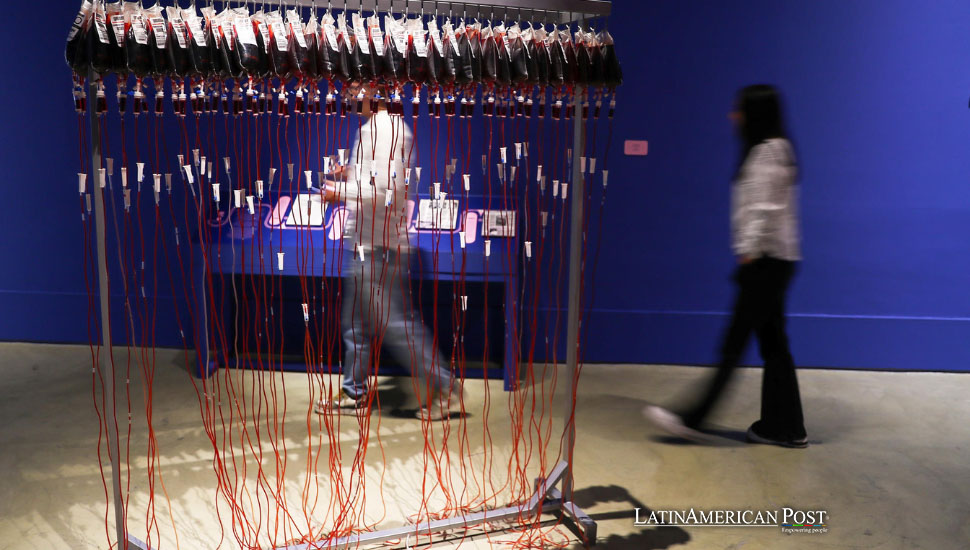Latin American Artists Tackle HIV Stigma Through Powerful Exhibition

In Quito, Ecuador, an exhibition titled ‘Positiva’ brings together nine HIV-positive artists from seven Latin American countries. The artists utilize multimedia, poetry, and photography to challenge the enduring stigma surrounding HIV.
In the vibrant cultural landscape of Quito, Ecuador, an impactful exhibition titled ‘Positiva. Residencia artística de cultura VIH latinoamericana’ is currently making waves. Held at the Centro de Arte Contemporáneo (CAC), this exhibition showcases the works of nine HIV-positive artists from seven Latin American countries who use their art to combat the stigma and discrimination associated with HIV/AIDS.
The history of HIV in Latin America is fraught with challenges, similar to the global narrative but underscored by the region’s unique socio-economic conditions and cultural attitudes towards sexuality and disease. In the 1980s and 1990s, as HIV emerged as a global epidemic, Latin America faced significant hurdles due to limited resources, lack of adequate public health strategies, and widespread stigma. These issues were compounded by social inequalities and often punitive laws that targeted marginalized communities, making the fight against HIV particularly challenging.
Breaking Silence Through Art
The artists participating in ‘Positiva’ aim to reshape the conversation around HIV, moving beyond the fear and prejudice that have historically defined it. Through their creative expressions, they offer intimate insights into the lives of people living with HIV, advocating for a more nuanced understanding of the virus and those it affects.
The exhibition highlights individual stories and reflects a broader trend of international cooperation in the fight against HIV/AIDS. By partnering with artists from across the region, ‘Positiva’ fosters a sense of community and solidarity among those impacted by HIV, transcending borders and cultural barriers.
Each piece in the exhibition, whether a visual artwork, a poem, or a photographic essay, serves as a testament to the resilience and courage of its creator. Camila Arce from Argentina, one of the featured artists, has utilized her platform to emphasize that HIV is not just an issue for homosexual men—a common misconception—but affects a diverse range of individuals, including a significant number of women.
Arce’s work includes a timeline of HIV in Latin America and interviews with women living with HIV, highlighting their stories of resilience and empowerment. These narratives challenge the traditional portrayal of HIV-positive individuals and advocate for a more inclusive approach to HIV awareness and treatment.
Overcoming Stigma and Promoting Inclusivity
The exhibition also addresses the persistent stigma that surrounds HIV, mainly through the experiences shared by women. Arce notes that the discrimination faced by women living with HIV has evolved but still exists, influenced by gender dynamics and societal expectations. The exhibition challenges these prejudices directly, offering a space for voices often sidelined in mainstream discussions about HIV.
Interestingly, Arce points out that HIV-positive women have been inadvertently contributing to the feminist movement without always realizing it. By founding networks and support groups, such as the Red Argentina de Mujeres Viviendo con VIH, these women have advocated for their rights and dignity, echoing broader feminist principles.
The Urgent Need for Support and Recognition
Despite the powerful messages conveyed through ‘Positiva,’ the fight against HIV in Latin America remains a daunting challenge. Funding and support for HIV-related programs are often insufficient, and public awareness campaigns struggle to reach all corners of society. The exhibition underscores the critical need for sustained investment in health education and social services that can accommodate the unique needs of those living with HIV.
Also read: Latin American Art Shines at Venice’s Prestigious Biennale
‘Positiva’ is more than an art exhibition; it is a clarion call for change in the perception and treatment of HIV/AIDS in Latin America. By giving a platform to HIV-positive artists, the exhibition challenges existing stereotypes and advocates for a society that embraces all its members, regardless of their health status. As Latin America continues to grapple with the legacy of HIV/AIDS, initiatives like ‘Positiva’ play a crucial role in ensuring that the conversation moves forward, driven by empathy, understanding, and respect.




